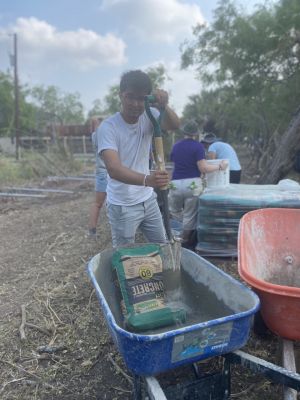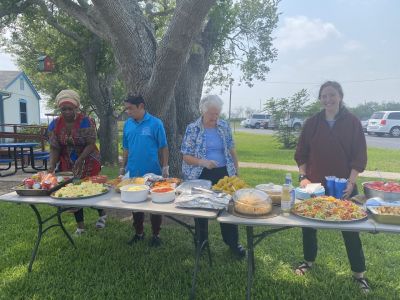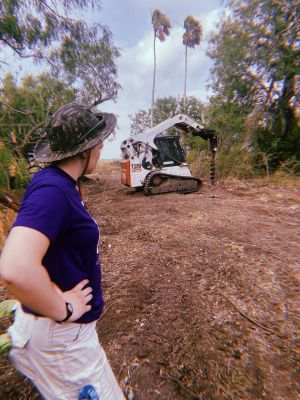This morning I woke up at 5:45 am, a little later than usual, with breakfast at 6:00 am and ready to leave by 7:20 am for the worksite at La Posada.
After a few delays, we headed to the worksite at La Posada. The first thing we all did upon arriving was apply sunscreen and repellent to help us protect ourselves from the harsh Texas sun and heat. After filling our water bottles with water to help us be hydrated as a group, we all headed to the last section of the fence with our amazing MDS crew (Larry and Roger) to finish the last piece of our mission here at La Posada. We were all feeling adrenaline to finish setting up the last remaining 30 poles and holes that needed to be done before we were completely done. As a group, we worked on the majority of the fence, but there is still work to be done.
I had the opportunity for the past two weeks to work on different sections of the fence and learn new skills that I can apply back home to my own community. It’s truly a privilege to experience and do things that are unfamiliar to truly understand what people are going through. This is what I learned with MDS but also with La Posada.
Today was a bit different in that several of us helped Angel, the main cook at La Posada, in the kitchen to help prepare for a farewell lunch. One of the groups was working on digging up holes while the other group mixed the concrete. I was part of the concrete mixer group. Mixing concrete over the past two weeks, I felt like a pro and maybe I have developed some muscles! In the beginning, it was a challenging task, but as a group, we all came together! Even our TA, Joel, joined us to help finish putting concrete in the holes.
Right before lunch at noon, our Goshen College group, La Posada, and the MDS crew got together around our last hole that needed to be filled with concrete. There was a small celebration and farewell that was given by one of our MDS project leaders, Larry. With excitement, we thanked everyone for their hard work and dedication in working on the fence. Larry, Roger, and one Goshen College student poured the last hole with concrete.
Throughout these two weeks, we completed roughly 31,000 pounds of cement of 80 pounds of concrete, for a total of around 400 hundred bags of concrete!
Once we completed filling all of the holes with concrete, we all headed to the front of Casa Belen where La Posada staff prepared us a farewell lunch. The food was made by Angel, a Honduran refugee who is the main cook at La Posada. He made us Honduran empanadas (called pastelitos) as well as rice, mac and cheese, salads, and cut-up fruits. It was a nice farewell lunch prepared by La Posada to give thanks to Goshen College and MDS for our hard work working with them, but most importantly for the fence. Even though all of our food was flying away due to the strong winds, we all shared a wonderful afternoon.
I had a reflective experience at La Posada when it came to issues of immigration. Their mission is to provide shelter for those fleeing persecution, natural disasters, or other life-threatening causes in their country of origin. I am grateful for the experience and helping with building a security fence for the people at La Posada when it comes to making the staff, volunteers, and guests feel safer. Most importantly, learning and hearing from guests’ difficult journeys in the hope of a better life and future was very powerful for me.
On our way back to the church we are living at, we had the opportunity to visit a local colonia (community or neighborhoods). We specifically visited the Indian Hill colonia in Hidalgo County, Texas. Historically, many of the homes in colonias lack basic living necessities, including drinkable water, sewer systems, and electricity. Many people who live in colonias are people of color, specifically immigrants, and have higher risks of certain health conditions such as diabetes and asthma.
Something that stood out to me when driving around the colonia was the lack of basic necessities such as sidewalks, streetlights, and public transportation. Having limited public transportation can limit residents’ access to seeking primary care, social services, healthcare, and supermarkets. I noticed many have fences around their homes for safety reasons, as well as dogs for protection for their sense of security. However, colonias for many, are opportunities to seek affordable housing and have a home to call their own. Most importantly, the colonias are community-based, where you get to know your neighbors.
As a public health graduate in 2022, these are issues I think need to be addressed. The colonias contain various risk factors related to the social determinants of health, such as economic security, education, and well-being. In order to reduce further health disparities, it is necessary to tackle and improve the conditions in which vulnerable populations and at-risk populations live.
-Kelly Cortez, Goshen College Class ’22, Public Health major








